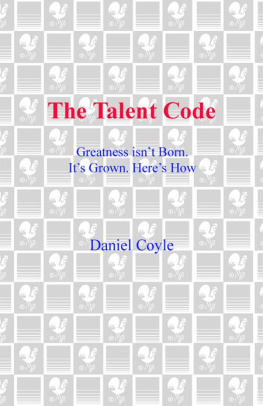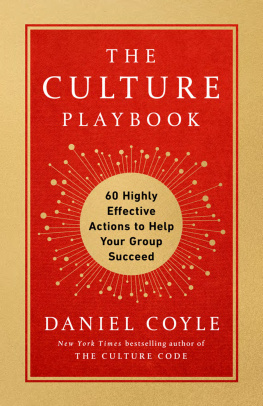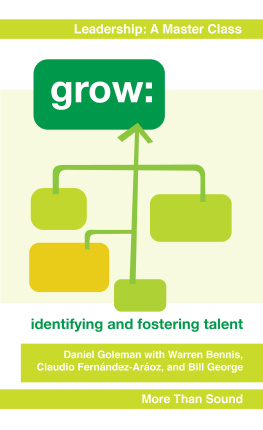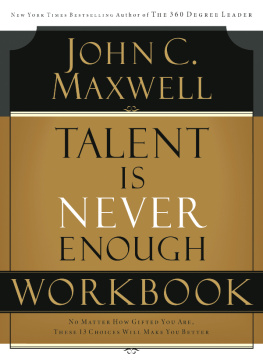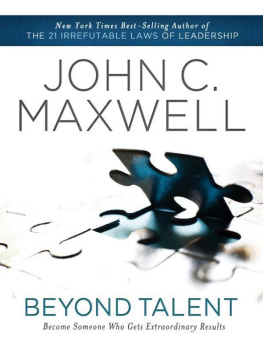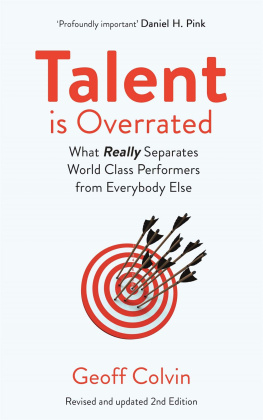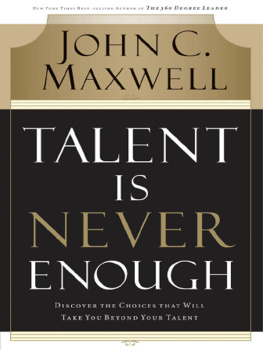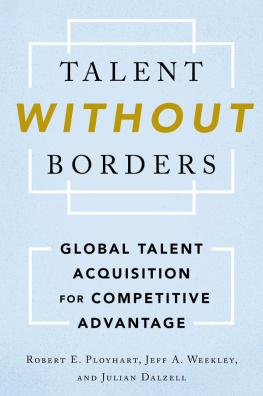ALSO BY DANIEL COYLE
Hardball: A Season in the Projects
Waking Samuel
Lance Armstrong's War

For Jen
Contents
PART I.
Chapter 1:
Chapter 2:
Chapter 3:
Chapter 4:
PART II.
Chapter 5:
Chapter 6:
Chapter 7:
Part III.
Chapter 8:
Chapter 9:
Chapter 10:
Then [David] took his staff in his hand, chose five smooth stones from the stream, put them in the pouch of his shepherd's bag and, with his sling in his hand, approached Goliath. 1 Samuel 17:40 Introduction THE GIRL WHO DID A MONTH'S WORTH
OF PRACTICE IN SIX MINUTES Every journey begins with questions, and here are three: How does a penniless Russian tennis club with one indoor court create more top-twenty women players than the entire United States? How does a humble storefront music school in Dallas, Texas, produce Jessica Simpson, Demi Lovato, and a succession of pop music phenoms? How does a poor, scantily educated British family in a remote village turn out three world-class writers? Talent hotbeds are mysterious places, and the most mysterious thing about them is that they bloom without warning. The first baseball players from the tiny island of the Dominican Republic arrived in the major leagues in the 1950s; they now account for one in nine big-league players. The first South Korean woman golfer won a Ladies Professional Golf Association (LPGA) tournament in 1998; now there are forty-five on the LPGA Tour, including eight of the top twenty money winners. In 1991 there was only one Chinese entry in the Van Cliburn piano competition; the most recent competition featured eight, a proportional leap reflected in top symphony orchestras around the world. Media coverage tends to treat each hotbed as a singular phenomenon, but in truth they are all part of a larger, older pattern. Consider the composers of nineteenth-century Vienna, the writers of Shakespearean England, or the artists of the Italian Renaissance, during which the sleepy city of Florence, population 70,000, suddenly produced an explosion of genius that has never been seen before or since. In each case, the identical questions echo: Where does this extraordinary talent come from? How does it grow? The answer could begin with a remarkable piece of video showing a freckle-faced thirteen-year-old girl named Clarissa. Clarissa (not her real name) was part of a study by Australian music psychologists Gary McPherson and James Renwick that tracked her progress at the clarinet for several years. Officially, the video's title is shorterclarissa3.mov , but it should have been called The Girl Who Did a Month's Worth of Practice in Six Minutes . On screen, Clarissa does not look particularly talented. She wears a blue hooded sweatshirt, gym shorts, and an expression of sleepy indifference. In fact, until the six minutes captured on the video, Clarissa had been classified as a musical mediocrity. According to McPherson's aptitude tests and the testimony of her teacher, her parents, and herself, Clarissa possessed no musical gifts. She lacked a good ear; her sense of rhythm was average, her motivation subpar. (In the study's written section, she marked because I'm supposed to as her strongest reason for practicing.) Nonetheless, Clarissa had become famous in music-science circles. Because on an average morning McPherson's camera captured this average kid doing something distinctly un-average. In five minutes and fifty-four seconds, she accelerated her learning speed by ten times, according to McPherson's calculations. What was more, she didn't even notice. McPherson sets up the clip for us: It's morning, Clarissa's customary time for practice, a day after her weekly lesson. She is working on a new song entitled Golden Wedding, a 1941 tune by jazz clarinetist Woody Herman. She's listened to the song a few times. She likes it. Now she's going to try to play it. Clarissa draws a breath and plays two notes. Then she stops. She pulls the clarinet from her lips and stares at the paper. Her eyes narrow. She plays seven notes, the song's opening phrase. She misses the last note and immediately stops, fairly jerking the clarinet from her lips. She squints again at the music and sings the phrase softly. Dah dah dum dah, she says. She starts over and plays the riff from the beginning, making it a few notes farther into the song this time, missing the last note, backtracking, patching in the fix. The opening is beginning to snap togetherthe notes have verve and feeling. When she's finished with this phrase, she stops again for six long seconds, seeming to replay it in her mind, fingering the clarinet as she thinks. She leans forward, takes a breath, and starts again. It sounds pretty bad. It's not music; it's a broken-up, fitful, slow-motion batch of notes riddled with stops and misses. Common sense would lead us to believe that Clarissa is failing. But in this case common sense would be dead wrong. This is amazing stuff, McPherson says. Every time I watch this, I see new things, incredibly subtle, powerful things. This is how a professional musician would practice on Wednesday for a Saturday performance. On screen Clarissa leans into the sheet music, puzzling out a G-sharp that she's never played before. She looks at her hand, then at the music, then at her hand again. She hums the riff. Clarissa's posture is tilted forward; she looks as though she is walking into a chilly wind; her sweetly freckled face tightens into a squint. She plays the phrase again and again. Each time she adds a layer of spirit, rhythm, swing. Look at that! McPherson says. She's got a blueprint in her mind she's constantly comparing herself to. She's working in phrases, complete thoughts. She's not ignoring errors, she's hearing them, fixing them. She's fitting small parts into the whole, drawing the lens in and out all the time, scaffolding herself to a higher level. This is not ordinary practice. This is something else: a highly targeted, error-focused process. Something is growing, being built. The song begins to emerge, and with it, a new quality within Clarissa. The video rolls on. After practicing Golden Wedding, Clarissa goes on to work on her next piece, The Blue Danube. But this time she plays it in one go, without stopping. Absent of jarring stops, the tune tumbles out in tuneful, recognizable form, albeit with the occasional squeak. McPherson groans. She just plays it, like she's on a moving sidewalk, he says. It's completely awful. She's not thinking, not learning, not building, just wasting time. She goes from worse than normal to brilliant and then back again, and she has no idea she's doing it. After a few moments McPherson can't take it anymore. He rewinds to watch Clarissa practice Golden Wedding again. He wants to watch it for the same reason I do. This is not a picture of talent created by genes; it's something far more interesting. It is six minutes of an average person entering a magically productive zone, one where more skill is created with each passing second. Good God, McPherson says wistfully. If somebody could bottle this, it'd be worth millions.
This book is about a simple idea: Clarissa and the talent hotbeds are doing the same thing. They have tapped into a neurological mechanism in which certain patterns of targeted practice build skill. Without realizing it, they have entered a zone of accelerated learning that, while it can't quite be bottled, can be accessed by those who know how. In short, they've cracked the talent code. The talent code is built on revolutionary scientific discoveries involving a neural insulator called myelin, which some neurologists now consider to be the holy grail of acquiring skill. Here's why. Every human skill, whether it's playing baseball or playing Bach, is created by chains of nerve fibers carrying a tiny electrical impulsebasically, a signal traveling through a circuit. Myelin's vital role is to wrap those nerve fibers the same way that rubber insulation wraps a copper wire, making the signal stronger and faster by preventing the electrical impulses from leaking out. When we fire our circuits in the right waywhen we practice swinging that bat or playing that noteour myelin responds by wrapping layers of insulation around that neural circuit, each new layer adding a bit more skill and speed. The thicker the myelin gets, the better it insulates, and the faster and more accurate our movements and thoughts become. Myelin is important for several reasons. It's universal: everyone can grow it, most swiftly during childhood but also throughout life. It's indiscriminate: its growth enables all manner of skills, mental and physical. It's imperceptible: we can't see it or feel it, and we can sense its increase only by its magical-seeming effects. Most of all, however, myelin is important because it provides us with a vivid new model for understanding skill. Skill is a cellular insulation that wraps neural circuits and that grows in response to certain signals . The more time and energy you put into the right kind of practicethe longer you stay in the Clarissa zone, firing the right signals through your circuitsthe more skill you get, or, to put it a slightly different way, the more myelin you earn. All skill acquisitions, and therefore all talent hotbeds, operate on the same principles of action, no matter how different they may appear to us. As Dr. George Bartzokis, a UCLA neurologist and myelin researcher, put it, All skills, all language, all music, all movements, are made of living circuits, and all circuits grow according to certain rules. In the coming pages we'll see those rules in action by visiting the world's best soccer players, bank robbers, violinists, fighter pilots, artists, and skateboarders. We'll explore some surprising talent hotbeds that are succeeding for reasons that even their inhabitants cannot guess. We'll meet an assortment of scientists, coaches, teachers, and talent researchers who are discovering new tools for acquiring skill. Above all, we'll explore specific ways in which these tools can make a difference in maximizing the potential in our own lives and the lives of those around us. The idea that all skills grow by the same cellular mechanism seems strange and surprising because the skills are so dazzlingly varied. But then again, all of this planet's variety is built from shared, adaptive mechanisms; evolution could have it no other way. Redwoods differ from roses but both grow through photosynthesis. Elephants differ from amoebas but both use the same cellular mechanism to convert food into energy. Tennis players, singers, and painters don't seem to have much in common but they all get better by gradually improving timing and speed and accuracy, by honing neural circuitry, by obeying the rules of the talent codein short, by growing more myelin. This book is divided into three partsdeep practice, ignition, and master coachingwhich correspond to the three basic elements of the talent code. Each element is useful on its own, but their convergence is the key to creating skill. Remove one, and the process slows. Combine them, even for six minutes, and things begin to change.
Next page
